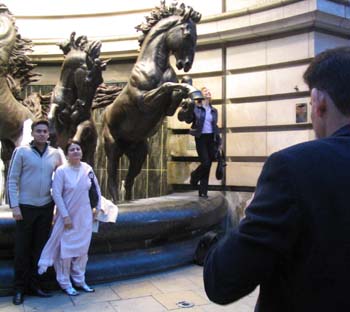We are developing the social individualist meta-context for the future. From the very serious to the extremely frivolous... lets see what is on the mind of the Samizdata people.
Samizdata, derived from Samizdat /n. - a system of clandestine publication of banned literature in the USSR [Russ.,= self-publishing house]
|
Over on the Social Affairs Unit blog, Michael Mosbacher takes Seamas Milne to task for the idiotic statement in the Guardian that the people fighting the US and UK are the ‘real’ liberation movement in Iraq, not the people who toppled Saddam Hussain.
On the broader topic of anti-Americanism however Mosbacher points out that Seamas Milne has a quite a way to go before he reaches the ‘stature’ of that florid friend of tyranny the world over, Harold Pinter, who has long been a pet hate of mine and others on this blog.
There is good news for the differently-conscienced and the caringly-caffeinated. They no longer have to exorcise their middle-class guilt by travelling overland to India or teaching English to ragamuffins in the shanty towns of Kinshasa.
Absolution is soon to be found right here in Central London:
The UK’s first fair trade coffee shops are set to open later this year, courtesy of Oxfam. And to give customers a flavour of what to expect, it opened one for a day in central London.
As if anybody does not know what to expect!
The food is fair trade wherever possible, so fruit, cereal bars and chocolate are “ethical” but pastries are not.
These diabolical right-wing, warmongering neo-pastries with their blundering, inept foreign policies are inflaming the ‘Arab street’ and bringing the world to the brink of war. It’s all about creeeeeeeeaaaamm!
“The cafes are about people enjoying classy coffee in a classy place. If they want to find out about the coffee and the issues they can make that discovery. It’s not about saying ‘Come and feel worthy’ but ‘come and have a super time’. The values are extra.”
Only if munching your way through an inedible cereal bar in the company of a bunch of po-faced do-gooders is your idea of a super time.
There are photographs on the walls showing the people who matter most in the venture – the farmers from Honduras, Ethiopia and Indonesia.
Collectively, they share 25% of the profits, community projects in those areas get another 25% and Oxfam has a 50% share.
In other words, some 75% ends up back in the pockets of the professional welfare classes. This is not ‘fair trade’, its a money-laundering scheme.
Two cups of hot, steaming piety, please!
Well trade here seems to be rather light, so here, given that writing adequately is beyond me just now, are some photos I took earlier. Earlier this evening to be exact. The light was fading fast, but a few of my snaps came out okay.
I like the effect you get when the background is a London bus. Lots of colour, but blurred, and if the figures in the foreground come out well, it can look great.
As you can see, I like to take pictures of people who are taking pictures. Sometimes, as here, I include the people they are photographing. And look, over on the right is a lady posing for another photographer away to the right. I only noticed her after I got home. The horses are a big fountain statue just to the edge of Piccadilly Circus, and are, I think, much more impressive than Eros.
This next bunch of people are doing a characteristic digital camera thing which Real Photographers never do. They are looking together at the picture they have just taken on that little TV type screen that digital cameras mostly now have.
But now here is a shot of London life of a quite different sort. The London Underground is a creeking, groaning, deafeningly loud, hideously crowded … Underground. But they are amazingly quick to put up the posters about any problems they are having.
When I see posters like these, I am part angry, and part impressed. Such a fuck up, and so courteously explained!
I cannot end on this grim note, so here is a happier Underground related picture, this time of a Coca Cola advert done in the lights of Piccadilly Circus, which are supposedly famous, but usually rather feeble, I think. But this was nice. This picture is probably too small, but trust me, it looked very fine.
London. As Doctor Johnson said, if you are tired of London, go to bed and get yourself a good night’s sleep and you will probably feel much better in the morning.
I have just started a weekly environment column for the Brussels-based Centre for the New Europe.
My first article called Reports of My Extinction are Greatly Exaggerated is about the ‘reappearance’ of previously ‘extinct’ species, in this case the New Zealand storm petrel, believed extinct for 150 years. No animal conservation programme can claim credit for this, although with a ban on trafficking, expect a market to develop in contraband. So governmental action may actually provoke the extinction of the bird.
[I am aware that at the moment individual articles do not link, I shall be speaking to the CNE webmaster about this.]
There will be much muttering in their beards in the caves of Tora Bora. There will be much gnashing of teeth and gnawing of livers in the ghettos of the Democratic National Committee.
A new front has opened in the struggle for freedom.
Age 25, single, 5 foot 11 inches: the new Miss America describes herself as “a Republican” and says that she will use her influence to explain America’s involvement in Iraq. Miss Shandi Finnessey is a statuesque blonde from St Louis, Missouri and replaces last year’s winner from Massachusetts. [Thanks to Pejmanesque.com for the link.]
Note: Missouri voted Republican last presidential election. Any bets this time?
By every standard that can be measured, participation and interest in electoral politics in this country is in precipitous decline. With every year that passes the figures for voter turnout, party membership and financial donations drop a few more points down the graph.
The process is slow but apparently inexorable and (for obvious reasons) it is sending an adenalin-rush of panic coursing through the veins of the political classes:
Democracy needs strong political parties. And for them to be representative and effective, they need to be properly funded. In the past 50 years, parties have seen their income and membership decline dramatically while expectations of what they should do have increased.
Says Leader of the Commons and Secretary of State for Wales, Peter Hain, who appears to be far less concerned with political bankruptcy than with the very real threat of financial bankruptcy:
In return for public funding, parties should be obliged to direct a certain amount of their work to community organisation and to educational material for voters. We might, for example, borrow the idea from Germany of creating party-linked, publicly funded foundations which could take on this education and policy formation work.
This relates to the third principle: extending public funding will create a more bottom-up style of politics, with political parties better embedded in local communities, for example by financing youth organisers in major towns or population centres, so reaching young people disturbingly turned off politics.
Public funds could be earmarked for salaries to employ general party organisers at national, regional and local level, as happens in Sweden, Germany and other European countries. Public funds could also pay for training and political education schemes and international contacts between parties.
So Mr. Hain is proposing that the funding that he and his colleagues have signally failed to amass through voluntary donation should now be taken by force. In return for this ‘generosity’, civil society will be merged with ‘the party’ to become a single living, breathing, sweating, symbiotic creature of state.
More public funding could help all parties extend their work beyond the world of political activists, creating a politics that serves the people and not just politicians.
Some people will believe that. But then some people will believe anything.
The raison d’etre for being a politician, or to use that wonderfully explicit Americanism, a ‘lawmaker’, is to pass laws. This is a topic I have often pondered before. Without that ability, a politician’s power of patronage completely disappears and with it, the funds given by people who want laws enacted that tilts the table in favour their personal or factional interests. To be a politician is to see the world as something to be legislated.
Thus when I hear that there is another push in the US to pass laws that will ‘control the availability of pornography to minors’, I feel the urge to nod sagely and marvel at yet another example of the triumph of image over substance. Now I know you expect the usual rant from me regarding how such legislation is a violation of both freedom of expression and freedom of association, but as any regular reader of Samizdata.net already knows my views on that, let me just point out that what really interests me is that ‘lawmakers’ are so happy to pass laws that have no chance whatsoever of making the slightest difference to the perceived problem at hand. This is nothing new of course, but it is sometimes worth reminding oneself why this happens so often.
The public appearance of a politico ‘doing something’ is far more valuable to that politico than actually addressing the problems they are called on to fix. Thus the actual efficacy of a measure, or even the prospect of the law passing, is often largely incidental to the decision to try and enact a law. Thus if the ACLU, EFF, FOREST or whoever get a bill strangled at birth, the politico can shake his head sadly at his enraged backers and say “Hey, I tried, but those slimy [civil rights/capitalist/pinko/faggot] S.O.Bs got in the way”.
And thus a sublimely fungible business like Internet pornography, much of which already runs off servers in Romania, Bangladesh and Brazil (places not known for giving a flying whatever what laws get enacted in the USA), is going to be effectively regulated by some American law how exactly?
Do the majority of legislators actually care? Probably not, other that a small semi-demented cadre of folks from the less well travelled American hinterlands who probably cannot conceive that the world is filled with people who regard the antics of American Lawmakers with mild bemusement or utter indifference.
George Monbiot is as mad as hell and he’s not going to take it anymore. Narcolepsy-inducing speeches, plaintive whining and bogus statistics are no longer enough to bring about revolution. And George should know because he has tried all three.
The time for mere words has passed and the time for action has begun:
The formula for making things happen is simple and has never changed. If you wish to alter a policy or depose a prime minister between elections, you must take to the streets.
I think George is making yet another big mistake if he thinks that sleeping in shop doorways and begging strangers for money is going to change the world. But who am I to argue?
“It’s not the age, it’s the mileage.”
Like so many other bloggers have done, I could not resist generating a map of the places I have visited (though I feel India and Bahrain are a cheat because it was only changing airplanes)…
PS:
Ah yes, St. Valentine’s Day.  The shop windows are filled with endless tacky heart-shaped corporate eye-catchers and the air is filled with cupid’s arrows… and other rather faster moving objects. The shop windows are filled with endless tacky heart-shaped corporate eye-catchers and the air is filled with cupid’s arrows… and other rather faster moving objects.
Have fun.
No… not some tedious article about race…
Perhaps the reason I find snow in London so fascinating is that it is both uncommon, little more than a dusting and very picturesque. I do not recall finding it so interesting when I lived in the United States, but that might have been because when it snowed, verily the skies opened and it tended to be a significant inconvenience! That said, New Jersey copes better with 3 feet of snow that London does with 3 inches 
Last Saturday I decided to treat a friend of mine to a dinner at a restaurant, the Painted Heron, that received one of the most glowing reviews I have ever come across. It appeared in the last week’s Sunday paper magazine (no link, alas) and it certainly inspired me despite the fact I am not too keen on Indian food.
The dinner was an extraordinary experience. Despite our high expectations induced by Matthew Norman’s raving review, we were not disappointed. Everything – the decor, food and service – was excellent and the price commensurate with the quality we enjoyed. For our London-based readers I recommend to make a trip to 112 Cheyne Walk, SW10 and sample the gastrogasm-inducing fare we enjoyed.
I also applaud Matthew Norman whose restaurant review in the Sunday Telegraph Magazine is one of the sections of the paper I read regularly. His razor sharp witt is refreshing as he uses it to punture many a pompous restaurant’s pretentions. However, his vitriolic sarcasm had a day off when he wrote a review for the Painted Heron – one of the reasons I wanted to see this culinary marvel. And as it was substantiated, I am ready to trust his opinions in the future. He is by no means the only one to give high marks to the place. Although I cannot link to his review, I found another reviewer making pretty much the same points:
The food is bloody marvellous. Every single dish made me stamp my feet and howl at the moon.
The tandoori baby chicken came. And I came over all funny. This was a good strong bird not much bigger than a greedy quail, served whole, orange from the oven and trickling juices and runnels of bright yoghurt, served on onion kulcha bread.
I picked it up and tore in. Sweet Jesus. And then I was sorry again because the chicken in your local curry house is not fit to cluck orisons over the carcass of this princely bird-child.
Quite.
Still reeling from the culinary delights of the night before, I opened this week’s Sunday Telegraph and right in the news section I find out how Matthew Norman’s review of another restaurant has earned him a letter from the owner threatening to sue.
It was, both parties will submit, not quite a glowing review. Indeed, phrases such as “the eighth circle of hell”, “among the very worst restaurants in Christendom” and “meals of crescendoing monstrosity” may have conveyed the impression that Matthew Norman, the prize-winning restaurant critic of The Sunday Telegraph Magazine, was not entirely enamoured with the food on offer at Shepherds in Westminster, central London.
Last week, alas, things moved from the kitchen towards the courtroom. Richard Shepherd, the owner of Shepherds, whose restaurant has long been a favourite of politicians, is threatening to sue The Sunday Telegraph for libel because he was so hurt by the review.
Unless Mr Shepherd received damages paid to the charity of his choice, and the opportunity to write a letter defending his restaurant, he would have no choice but to sue.
It is not just a matter of free speech and the right to express one’s opinions, especially when one is getting paid for doing so, but the manner in which Mr Shepherd’s reacted to Mr Norman’s sharp and let’s face it, witty criticism.
Where do you start with somewhere like Shepherds? You don’t. If you have any sense you finish with it.
There is so much about Shepherds that is wrong that it would, in a more elegant age, merit a pamphlet rather than a review.
This is a man who likes his food and dislikes the kind of pretentious ‘concept’ restaurants that has sprouted all over London in the last decade or so. Apparently, many customers have written letters to the Telegraph expressing support to the restaurant with colourful insults directed at Mr Norman. One has to remember though that Shepherd’s is frequented by politicians whose palates are not necessarily amongst the most discriminating, what with having to kiss arses all day long…
Mr Shepherd’s response, or more accurately his lawyers’ response, is a seriously po-faced letter that completely misses the point of Mr Norman’s job and talent. It is almost distressing to see the kind of corporate bullying normally reserved for customers directed at a restaurant reviewer. There was at least one dissenter, John Blundell of the Institute of Economic Affairs, who wrote:
Thank you a million times for your brilliant review of Shepherds. I stopped eating there four years ago when we had to send back three of our four main courses.
Mr Norman himself appeared unrepentant, although he did admit that he had one regret.
The lawyers’ letter was far more amusing than my review. That’s the sad thing.
Somehow I doubt it…
|
Who Are We? The Samizdata people are a bunch of sinister and heavily armed globalist illuminati who seek to infect the entire world with the values of personal liberty and several property. Amongst our many crimes is a sense of humour and the intermittent use of British spelling.
We are also a varied group made up of social individualists, classical liberals, whigs, libertarians, extropians, futurists, ‘Porcupines’, Karl Popper fetishists, recovering neo-conservatives, crazed Ayn Rand worshipers, over-caffeinated Virginia Postrel devotees, witty Frédéric Bastiat wannabes, cypherpunks, minarchists, kritarchists and wild-eyed anarcho-capitalists from Britain, North America, Australia and Europe.
|















